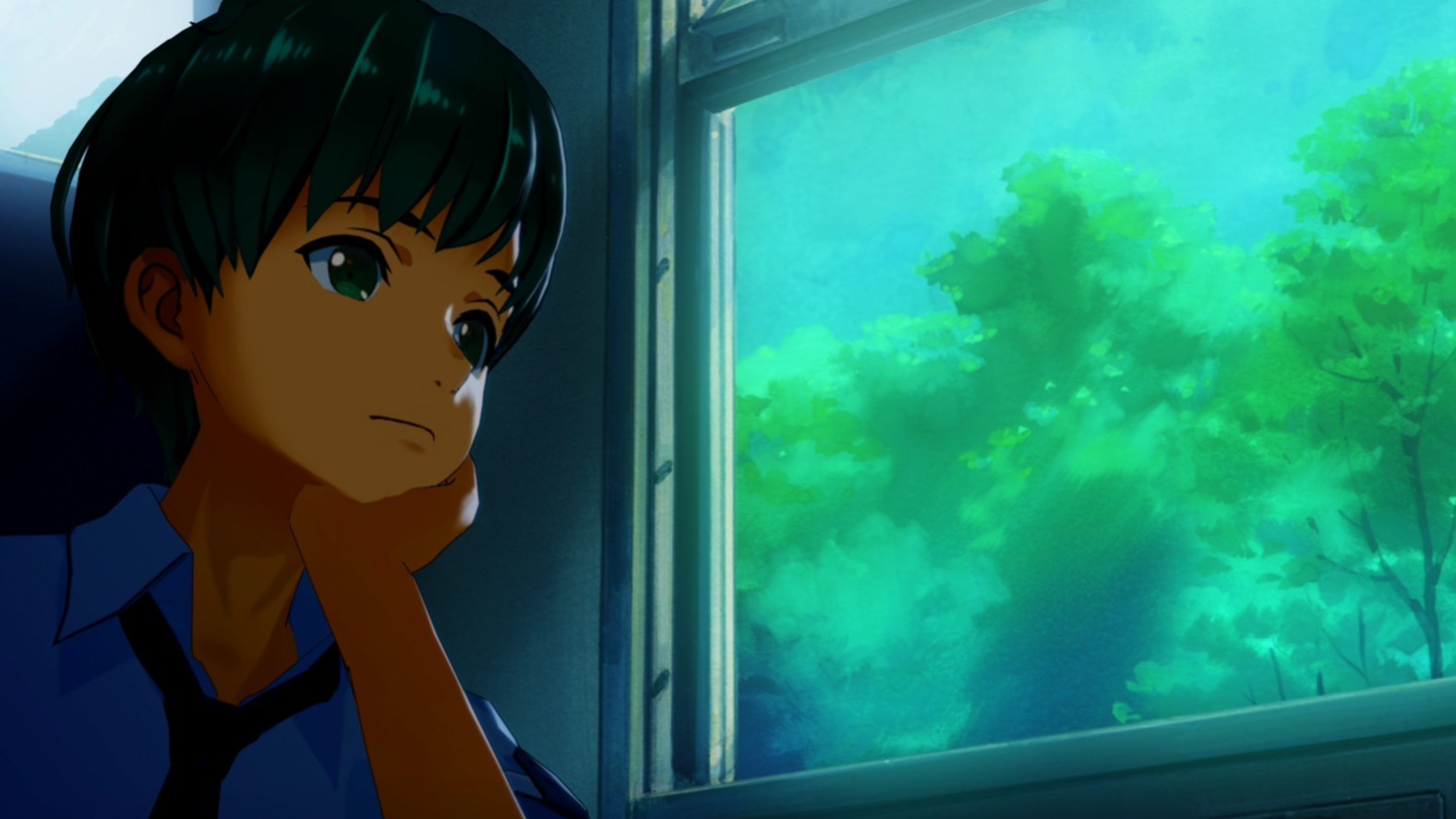
In Loop8, RPG stands for Relationship Playing Game.
I thought we had already used up a lifetime’s worth of good luck when last year’s sunshine ’em up Shin chan: Me and the Professor on Summer Vacation appeared on Steam, but now I’m wondering if this is going to be the season of spiritual sequels to niche Japanese games every year. If it is, Loop8: Summer of Gods arriving on Steam in English is the second game of my new favourite trend..
The source of inspiration this time around is 2000’s Gunparade March, which mixed cosy high school life with a looming apocalypse to incredible effect. Just like the PlayStation game that came before it, much of Loop8’s world has already succumbed to an overwhelming outside force—this time the dead themselves—with just one small corner of Japan escaping relatively unscathed. Yet even in this quiet little place nobody is who they seem; the rural village’s tiny school is somehow filled with gods, people possessed by gods, god slayers, an android, a divine squirrel, and one teenager who until recently lived in space. (That one’s you, by the way).
“Anyway,” says Loop8, “Never mind all that. How about a surfing lesson on the beach? Or a study session at a local restaurant?”
Most RPGs have some sort of relationship system, but Loop8 goes way, way, beyond picking the correct dialogue options until someone either becomes a firm friend or declares their undying love for the hero at a crucial moment.
Every connection your spaceborn character Nini makes—or breaks—has a direct impact on everything and everyone else. Relationships influence not only how much someone likes him and if they’ll say yes to a date, but also:
If they like someone elseIf they’re prepared to follow him into battleWhat they can and will do when they’re fighting by his sideWhether the party will collectively have the strength, intelligence, or bonds of friendship to break through the powerful underworld barriers separating them from the demonic entity waiting at the end.
Loop8’s character dynamics even goes so far as to take the current atmosphere of the room into account, which will be influenced as much by the location itself as the people within it. The default mood at a holy shrine is very different to a classroom, and both will be different again if someone seething after a recent argument or with an active dislike of the person Nini’s spending time with walks in looking for a fight.
(Image credit: Marvelous)
(Image credit: Marvelous)
(Image credit: Marvelous)
(Image credit: Marvelous)
(Image credit: Marvelous)
I was so caught up in this fluid maelstrom of clashing and complementary personalities I often forgot it was all the result of clever programming. A tearful character may not want to talk because you’ve caught them at a bad time. Another may be standing awkwardly away from others and refuse to socialise, or they may be upset after hearing a snide remark. On the other hand they may decide to walk over and strike up a conversation with you if they’re in a friendly mood, or playfully trip you up if they’re feeling chirpy and confident.
Having to intuit who said something and how/if you should try to smooth things over right now or back off and wait for a better time would be a heck of a lot more difficult without Nini’s “Demon Sight” superpower. This gives you little glimpses into a character’s current emotional state, current actions, and private thoughts. Sometimes it’s illuminating—you might discover someone’s irritable because they’ve recently been on the receiving end of a lengthy rant—and sometimes it leads to unique meta-issues, secret emotional layers only you can see.
In one instance I had someone sincerely say “I will always be by your side” to Nini’s face, only for their updated “Demon Sight” info to read “Action: Told a lie just now.”
Did they lie because they don’t like Nini as much as they say they do? Did they lie to spare Nini’s feelings, or because there’s some terrible personal obligation waiting in the wings they haven’t told him about yet? Thanks to Loop8’s wildly nonlinear structure, I may never know.
So flexible is Loop8’s story it’s even possible for multiple characters—including the ones head-over-heels in love with you and even the really important ones with divine backstories —to die at pretty much any time, and the game will simply carry on without them. The only thing that can stop a run is Nini’s death, and even that sees him wake up on the first day of August, ready to start all over again with a good chunk of the perks and knowledge he accrued last time. It’s a handy feature that removes the worry of permanently screwing up a good relationship with a bad decision while also allowing your free time to be whatever you want it to be—there are no wasted days when time’s a perfect circle. It gives the endless summer a slightly melancholy air too as on a fourth, fifth, sixth loop Nini has to stand and watch someone who half an hour earlier might have declared their love for him ask who he is or completely brush him off because they’re busy.
The only downside to Loop8’s tangle of gamified emotions is that modern miracles like this have to be squeezed into practical, budget-friendly forms. This beautiful village has a conspicuously limited number of locations for the small cast to wander around, and those few who are aware of the game it’s based on will soon realise that Gunparade March, released decades earlier on infinitely weaker hardware, was actually far more complex than this.
(Image credit: Marvelous)
(Image credit: Marvelous)
(Image credit: Marvelous)
(Image credit: Marvelous)
(Image credit: Marvelous)
(Image credit: Marvelous)
(Image credit: Marvelous)
(Image credit: Marvelous)
(Image credit: Marvelous)
But then again, a game that’s “only” half as complex as Gunparade March—a somewhat overwhelming experience that really did need players to read the 100+ page manual it came with—is still going to be at least twice as ambitious as almost any other claiming to have character relationships sitting at its core. And unlike Gunparade March, this summer of flings and forever-bonds is available in a range of languages beyond Japanese.
I know living in a sleepy rural town running on repeat sounds kinda loopy, but I love it. Who should I get to know this time around? How many times can I bear to love and lose this complicated mix of the earthly and the divine? I’m not sure, but I do know I’m not done falling in love with the game’s cast yet.
The apocalypse can wait—until the next time I have to live through the world’s last August, anyway.




